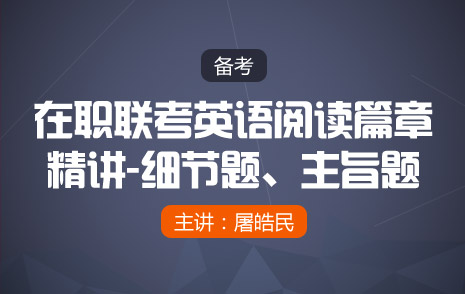2014-05-04 18:25:00 来源:网络发表评论
 在职联考准考证打印
在职联考准考证打印
备考辅导:英语备考策略和技巧 联考英语翻译备考策略 2015在职硕士考试经验技巧
GCT考试: GCT英语备考辅导 GCT数学备考辅导 GCT语文备考辅导 GCT逻辑备考
公共管理: 公文写作范文汇总 2015年在职MPA管理学案例材料 人力资源营销新论
艺术硕士: 艺术硕士艺术概论资料汇总 艺术硕士复习试题|答案 艺术硕士备考知识点
"It's our currency and your problem," U.S. Treasury Secretary John Connally famously said of the dollar in 1971.
More than 40 years later, China is doing something about it.
Fed up with what it sees as Washington's malign neglect of the dollar, China is busily promoting the cross-border use of its own currency, the yuan, also known as the renminbi, in trade and investment.
The aim is both narrowly commercial - to reduce transaction costs for Chinese exporters and importers - and sweepingly strategic.
Displacing the dollar, Beijing says, will reduce volatility in oil and commodity prices and belatedly erode the ‘exorbitant privilege' the United States enjoys as the issuer of the reserve currency at the heart of a post-war international financial architecture it now sees as hopelessly outmoded.
Zha Xiaogang, a researcher at the Shanghai Institutes for International Studies, said Beijing wants to see a better-balanced international monetary system consisting of at least the dollar, euro and yuan and perhaps other currencies such as the yen and the Indian rupee.
Competition among major currency issuers and a wider menu of options when investing, trading or seeking a store of value would produce better results for the world economy, Zha argued.
"The shortcomings of the current international monetary system pose a big threat to China's economy," he said. "With more alternatives, the margin for the U.S. would be greatly narrowed, which will certainly weaken the power basis of the U.S."
Zha's comments were in a paper prepared for a seminar in Bahrain this week on the geopolitics of currencies organized by the International Institute for Strategic Studies, a London think tank.
SHIFTING SANDS
The great financial crisis, alongside the ascent of China and other emerging markets and the existential threat to the euro, is prompting policymakers in the West, too, to question the established monetary order. Change is in the air.
But with no obvious alternative to the dollar for now, the timing and extent of any shifts in the existing order are inherently unpredictable, much like exchange rates themselves.
While Beijing sees opportunities in using the yuan beyond its borders, others see risks - not least to China itself: relaxing capital controls so foreigners can reinvest their accumulated yuan in China's securities markets is one of the preconditions of reserve currency status.
Yet allowing market-driven money flows to drive exchange and interest rates would weaken the ruling Communist Party's tight grip on two of the main economic levers, potentially sowing the very instability it abhors.
John Williamson, one of the foremost academics on exchange rates, went back to basics and questioned the assumption that reserve currency status confers vast benefits.
Whereas China, Brazil and others have laMBAsted the United States for deliberately cheapening the dollar through loose monetary policies, Williamson argued that U.S. exchange-rate flexibility is actually limited because the dollar is the anchor of the system. It is other countries that adjust their rates; the dollar then adjusts as a "residual".
Of course, the United States gets to finance its payments deficits more cheaply because of demand for dollars from reserve managers, but this might not be enough to outweigh the loss of freedom to manage its exchange rate.
"It is not surprising that many economists have therefore concluded that a reserve currency role is not advisable," said Williamson, a senior fellow at the Peterson Institute for International Economics in Washington.
He identified only two ways that U.S. power in the world economy is enhanced by the dollar's dominant role, which he does not expect to be challenged in the next quarter century.
First, the $3.2 trillion in official reserves that China has accumulated in maintaining the yuan's semi-fixed peg to the dollar tie Beijing's policy hands. That is because any hostile gesture, such as a threat to shift out of dollars, would destroy Chinese wealth.
Second, because of the extensive private use of the dollar globally, the United States is better able to enforce a financial blockade, such as the one now directed against Iran.
"I have the impression that the additional national power which stems from commanding an international currency tends to be exaggerated by strategic thinkers," he wrote.
ASIAN STRAINS
Yuriko Koike, a former Japanese defense minister, sees the power of currencies through a different prism. She said China was already using its economic might to build a "new model mercantilist imperialism" in Africa.
Turning to Asia, Koike said China's rise was likely to continue to incite as many fears as it does hopes. Beijing's economic clout was one more reason for Japan to put its financial house in order soon.
"So far, Chinese purchases of Japanese government bonds have been negligible, but the potential for China to gain influence over Japan in this regard is real and should be acknowledged," Koike, who was not present to discuss her paper, wrote.
Not surprisingly, Zha, the Shanghai researcher, saw the blossoming of the yuan as the currency equivalent of China's peaceful rise in foreign policy.
Before long, the renminbi would be the de facto common currency of a more economically and financially integrated East Asia that would thus speak with a "more consensus-oriented" regional voice in international affairs. The consensus, he implied, would be set out by China, whose economy would be at least twice as big as Japan's within a decade.
Harsha Vardanha Singh, deputy director-general of the World Trade Organization, said the yuan was the currency most likely to acquire reserve status in years to come.
But, because of the changing patterns of trade and the increase in supply chains, other currencies important in regional trade would assume a much larger significance on the global stage, he argued.
"These various developments will create a much more extensive multi-polar currency world than is usually anticipated," Singh said.
CURRENCY WAR AND PEACE
What does it all mean for the markets?
The phrase "currency wars" inevitably springs to mind as rising economies show their resentment of incumbents, notably the United States, which they view as resorting to maximum monetary stimulus without worrying about the global spillovers.
Surjit Bhalla, an Indian economist, believes massive undervaluation of the yuan was a major reason for China's meteoric rise and the deep economic iMBAlances that led to the 1997/98 Asian financial crisis and the 2008 global crash.
But Bhalla, author of a new book "Devaluing to Prosperity", is convinced that China is shedding its mercantilist skin and switching its development model from exports to consumption-led growth.
He sees little merit in greater international use of the yuan but expects Beijing to push up its real exchange rate by 3-5 percent a year in order to help lift private consumption to at least 50 percent of national output over time from around just 35 percent now.
The result, he said in an interview on the sidelines of the conference, would be an end to talk of currency wars as well as stronger global growth in both advanced economies and emerging markets such as China.
"This will be one of the most remarkable win-win situations of recent times," said Bhalla, chairman of Oxus Investments, a New Delhi hedge fund. "Currency peace is breaking out. There have been currency wars, but now is time to enjoy the peace."
 已帮助8878人
已帮助8878人
| GCT | 【特训】2015年GCT英语全程专项特训班 | ¥980 | 免费试听 |
| 【特训】2015GCT语文全程专项特训班 | ¥400 | 免费试听 | |
| 【特训】2015年GCT数学全程专项特训班 | ¥680 | 免费试听 | |
| 【特训】2015年GCT逻辑全程专项特训班 | ¥400 | 免费试听 | |
| 联考英语 | 【提高】2015年联考英语技巧提高班 | ¥680 | 免费试听 |
| 【冲刺】2015年联考英语冲刺抢分班 | ¥680 | 免费试听 | |
| 法律硕士 | 【全程】2015法律硕士专业综合全程 | ¥880 | 免费试听 |
| 工商管理 | 写作专项零基础班数学专项逻辑专项 | ||
| 专项班 | 公共管理会计硕士教育硕士艺术硕士 | ||
版权及免责声明
1,"新东方在线"上的内容,包括文章、资料、资讯等, 本网注明"稿件来源:新东方在线"的,其版权 均为"新东方在线"或北京新东方迅程网络科技有限公司所有 ,任何公司、媒体、网站或个人未经授权不得转载、链接、转贴或以其他方式使用。已经得到 "新东方在线"许可 的媒体、网站,在使用时必须注明"稿件来源:新东方",违者本网站将依法追究责任。
2, "新东方在线" 未注明"稿件来源:新东方"的 文章、资料、资讯等 均为转载稿,本网站转载出于传递更多信息之目的,并不意味着赞同其观点或证实其内容的真实性。如其他媒体、网站或个人从本网站下载使用,必须保留本网站注明的"稿件来源",并自负版权等法律责任。如擅自篡改为 " 稿件来源:新东方 " ,本网站将依法追究其法律责任。
3,如本网转载稿涉及版权等问题,请作者见稿后在两周内与新东方在线联系。

 w
12分56秒
w
12分56秒